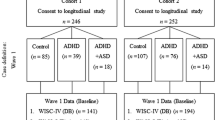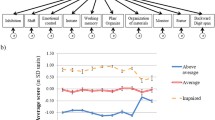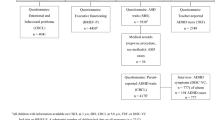Abstract
There is substantial comorbidity between autism spectrum disorder (ASD) and attention deficit/hyperactivity disorder (ADHD), and there are well-documented executive functioning (EF) deficits in both populations. An important question concerns whether EF deficits in children with ASD are related to severity of ASD, ADHD, or both. We examined ADHD and ASD symptoms in relation to ratings of EF in the home and classroom. The sample comprised 64 children (55 males) diagnosed with ASD (mean age = 9.26 years; mean FSIQ = 92). Analyses indicated that parent and teacher ratings of EF (except Shift and Emotional Control) were consistently related to ADHD symptom severity, but not to ASD severity. Thus, functioning in the domains of Shift and Emotional control appear relatively spared, whereas performance in all other EF was impaired in relation to ADHD symptoms.


Similar content being viewed by others
References
Alloway, T. P., Gathercole, S. E., Holmes, J., Place, M., Elliott, J. G., & Hilton, K. (2009). The diagnostic utility of behavioral checklists in identifying children with ADHD and children with working memory deficits. Child Psychiatry and Human Development, 40(3), 353–366. https://doi.org/10.1007/s10578-009-0131-3.
Barkley, R. A. (1997). Behavioral inhibition, sustained attention, and executive functions: Constructing a unifying theory of ADHD. Psychological Bulletin, 121(1), 65. https://doi.org/10.1037/0033-2909.121.1.65.
Blijd-Hoogewys, E. M. A., Bezemer, M. L., & van Geert, P. L. C. (2014). Executive functioning in children with ASD: An analysis of the BRIEF. Journal of Autism and Developmental Disabilities, 44, 3089–3100. https://doi.org/10.1007/s10803-014-2176-9.
Conners, C. K. (1997). Conners’ Parent Rating Scale-Revised (L). North Tonawanda, NY: Multi-Health Systems.
Corbett, B. A., Constantine, L. J., Hendren, R., Rocke, D., & Ozonoff, S. (2009). Examining executive functioning in children with autism spectrum disorder, attention deficit hyperactivity disorder and typical development. Psychiatry Research, 166(2–3), 210–222. https://doi.org/10.1016/j.psychres.2008.02.005.
Craig, F., Margari, F., Legrottaglie, A. R., Palumbi, R., De Giambattista, C., & Margari, L. (2016). A review of executive function deficits in autism spectrum disorder and attention-deficit/hyperactivity disorder. Neuropsychiatric Disease and Treatment, 12, 1191–1202. https://doi.org/10.2147/NDT.S104620.
Danielsson, H., Henry, L., Messer, D., & Rönnberg, J. (2012). Strengths and weaknesses in executive functioning in children with intellectual disability. Journal of Research in Developmental Disabilities, 2(33), 600–607. https://doi.org/10.1016/j.ridd.2011.11.004.
Demetriou, E. A., Lampit, A., Quintana, D. S., Naismith, S. L., Song, Y. J. C., Pye, J. E., et al. (2018). Autism spectrum disorders: A meta-analysis of executive function. Molecular Psychiatry, 23, 1198–1204. https://doi.org/10.1038/mp.2017.75.
Everett, J., Thomas, J., Cote, F., Levesque, J., & Michaud, D. (1991). Cognitive effects of psychostimulant medication in hyperactive children. Child Psychiatry and Human Development, 22(2), 79–87. https://doi.org/10.1007/BF00707786.
Gau, S. S. F., & Shang, C. Y. (2010). Improvement of executive functions in boys with attention deficit hyperactivity disorder: An open-label follow-up study with once-daily atomoxetine. International Journal of Neuropsychopharmacology, 13(2), 243–256. https://doi.org/10.1017/S1461145709990836.
Geurts, H. M., Verté, S., Oosterlaan, J., Roeyers, H., & Sergeant, J. A. (2004). How specific are executive functioning deficits in attention deficit hyperactivity disorder and autism? Journal of Child Psychology and Psychiatry, 45(4), 836–854. https://doi.org/10.1111/j.1469-7610.2004.00276.x.
Gioia, G. A., Isquith, P. K., Guy, S. C., & Kenworthy, L. (2000a). TEST REVIEW behavior rating inventory of executive function. Child Neuropsychology, 6, 235–238. https://doi.org/10.1076/chin.6.3.235.3152.
Gioia, G. A., Isquith, P. K., Guy, S. C., & Kenworthy, L. (2000b). BRIEF Behavior rating inventory of executive function: Professional manual. Lutz: Psychological Assessment Resources.
Gioia, G. A., Isquith, P. K., Kenworthy, L., & Barton, R. M. (2002). Profiles of everyday executive function in acquired and developmental disorders. Child Neuropsychology, 8(2), 121–137. https://doi.org/10.1076/chin.8.2.121.8727.
Goldberg, M. C., Mostofsky, S. H., Cutting, L. E., Mahone, E. M., Astor, B. C., Denckla, M. B., et al. (2005). Subtle executive impairment in children with autism and children with ADHD. Journal of Autism and Developmental Disorders, 35(3), 279–293. https://doi.org/10.1007/s10803-005-3291-4.
Granader, Y., Wallace, G. L., Hardey, K. K., Yerys, B. E., Lawson, R. A., Rosenthal, M., et al. (2014). Characterizing the factor structure of parent reported executive function in autism spectrum disorders: The impact of cognitive inflexibility. Journal of Autism and Developmental Disorder, 44(12), 3056–3062. https://doi.org/10.1007/s10803-014-2169-8.
Hale, J. B., Reddy, L. A., Semrud-Clikeman, M., Hain, L. A., Whitaker, J., Morley, J., et al. (2011). Executive impairment determines ADHD medication response: Implications for academic achievement. Journal of Learning Disabilities, 44(2), 196–212. https://doi.org/10.1177/0022219410391191.
Happe, F., Booth, R., Charlton, R., & Hughes, C. (2006). Executive function deficits in autism spectrum disorders and attention-deficit/hyperactivity disorder: Examining profiles across domains and ages. Brain and Cognition, 61(1), 25–39. https://doi.org/10.1016/j.bandc.2006.03.004.
Hovik, K. T., Egeland, J., Isquith, P. K., Gioia, G., Skogli, E. W., Andersen, P. N., et al. (2017). Distinct patterns of everyday executive function problems distinguish children with Tourette syndrome from children with ADHD or autism spectrum disorders. Journal of Attention Disorders, 21(10), 811–823. https://doi.org/10.1177/1087054714550336.
Howes, O. D., Rogdaki, M., Findon, J. L., Wichers, R. H., Charman, T., King, B. H., et al. (2018). Autism spectrum disorder: Consensus guidelines on assessment, treatment, and research from the British Association for Psychopharmacology. Journal of Psychopharmacology, 32(1), 3–29. https://doi.org/10.1177/0269881117741766.
John, T. S., Dawson, G., & Estes, A. (2018). Brief report: Executive function as a predictor of academic achievement in school-age children with ASD. Journal of Autism and Developmental Disabilities, 48(1), 276–283. https://doi.org/10.1007/s10803-017-3296-9.
Johnson, K., Murray, K., Spain, D., Walker, I., & Russell, A. (2019). Executive function: Cognition and behaviour in adults with autism spectrum disorders (ASD). Journal of Autism and Developmental Disorders, 49(10), 4181–4192. https://doi.org/10.1007/s10803-019-04133-7.
Kempton, S., Vance, A., Maruff, P., Luk, E., Costin, J., & Pantelis, C. (1999). Executive function and attention deficit hyperactivity disorder: Stimulant medication and better executive function performance in children. Psychological Medicine, 29(3), 527–538. https://doi.org/10.1017/S0033291799008338.
Lawson, R. A., Papadakis, A. A., Higginson, C. I., Barnett, J. E., Wills, M. C., Strang, J. F., et al. (2015). Everyday executive function impairments predict comorbid psychopathology in autism spectrum and attention deficit hyperactivity disorders. Neuropsychology, 29(3), 445. https://doi.org/10.1037/neu0000145.
Lefort-Besnard, J., Vogeley, K., Schilbach, L., Varoquaux, G., Thirion, B., Dumas, G., et al. (2020). Patterns of autism symptoms: Hidden structure in the ADOS and ADI-R instruments. Translational Psychiatry, 10, 257. https://doi.org/10.1038/s41398-020-00946-8.
Leitner, Y. (2014). The co-occurrence of autism and attention deficit hyperactivity disorder in children—What do we know? Frontiers in Human Neuroscience, 8, 268. https://doi.org/10.3389/fnhum.2014.00268.
Lord, C., Rutter, M., DiLavore, P., & Risi, S. (2001). Autism Diagnostic Observation Schedule-WPS Edition (ADOS-WPS). Los Angeles: Western Psychological Services.
Loveland, K. (2005). Social-emotional impairment and self-regulation in autism spectrum disorders. In J. Nadel & D. Muir (Eds.), Typical and impaired emotional development (pp. 365–382). Oxford: Oxford University Press.
Mansour, R., Dovi, A. T., Lane, D. M., Loveland, K. A., & Pearson, D. A. (2017a). ADHD severity as it relates to comorbid psychiatric symptomatology in children with autism spectrum disorders (ASD). Research in Developmental Disabilities, 60, 52–64.
Mansour, R, Ward A. R., Lane, D. M, Loveland, K. A, Aman, M. G., Jerger, S., et al. ADHD Severity as a predictor of cognitive task performance in children with autism spectrum disorder. Research in Developmental Disabilities (in press).
Ng, R., Heinrich, K., & Hodges, E. K. (2019). Brief report: Neuropsychological testing and informant-ratings of children with autism spectrum disorder, attention-deficit/hyperactivity disorder, or comorbid diagnosis. Journal of Autism and Developmental Disorders, 49, 2589–2596. https://doi.org/10.1007/s10803-019-03986-2.
Ozonoff, S., & Jensen, J. (1999). Brief report: Specific executive function profiles in three neurodevelopmental disorders. Journal of Autism Developmental Disorders, 29, 171–177. https://doi.org/10.1023/A:1023052913110.
Pearson, D. A., Aman, M. G., Arnold , L. E., Lane, D. M., Loveland, K. A., Santos, C. W., et al. (2012). High concordance of parent and teacher ADHD ratings in medicated and unmedicated children with autism spectrum disorders. Journal of Child and Adolescent Psychopharmacology, 22, 284–291. https://doi.org/10.1089/cap.2011.0067.
Pearson, D. A., Loveland, K. A., Lachar, D., Lane, D. M., Reddoch, S. L., Mansour, R., et al. ( (2006). A comparison of behavioral and emotional functioning in children and adolescents with autistic disorder and PDD-NOS. Child Neuropsychology, 12, 321–333. https://doi.org/10.1080/09297040600646847.
Pearson, D. A., Santos, C. W., Aman, M. G., Arnold, L. E., Casat, C. D., Mansour, R., et al. (2013). Effects of extended release methylphenidate treatment on ratings of attention-deficit/hyperactivity disorder (ADHD) and associated behavior in children with autism spectrum disorders and ADHD symptoms. Journal of Child and Adolescent Psychopharmacology, 23(5), 337–351. https://doi.org/10.1089/cap.2012.0096.
Pearson, D. A., Santos, C. W., Aman, M. G., Arnold, L. E., Lane, D. M., Loveland, K. A., et al. (2020). Effects of extended release methylphenidate treatment on cognitive task performance in children with autism spectrum disorder and ADHD. Journal of Child and Adolescent Psychopharmacology, 30(7), 414–426. https://doi.org/10.1089/cap.2020.0004
Podsakoff, P. M., MacKenzie, S. B., Lee, J.-Y., & Podsakoff, N. P. (October 2003). Common method biases in behavioral research: A critical review of the literature and recommended remedies. Journal of Applied Psychology., 88(5), 879–903. https://doi.org/10.1037/0021-9010.88.5.879.
Rapoport, J. L., Buchsbaum, M. S., Weingartner, H., Zahn, T. P., Ludlow, C., & Mikkelsen, E. J. (1980). Dextroamphetamine: Its cognitive and behavioral effects in normal and hyperactive boys and normal men. Archives of General Psychiatry, 37(8), 933–943. https://doi.org/10.1001/archpsyc.1980.01780210091010.
Reich, W. (2000). Diagnostic interview for children and adolescents (DICA). Journal of the American Academy of Child & Adolescent Psychiatry, 39(1), 59–66. https://doi.org/10.1097/00004583-200001000-00017.
Reich, W., Welner, Z., & Herjanic, B. (1997). Diagnostic interview for children and adolescents-IV (DICA-IV). New York: Multi-Health Systems Incorporated.
Roid, G. H. (2003). Stanford-Binet Intelligence Scales, fifth edition (SB:V). Itasca: Riverside Publishing.
Rosenthal, M., Wallace, G. L., Lawson, R., Will, M. C., Dixon, E., Yerys, B. F., et al. (2013). Impairments in real world executive function increase from childhood to adolescence in autism spectrum disorders. Neuropsychology, 27(1), 13–18. https://doi.org/10.1037/a0031299.
Rutter, M., Bailey, A., & Lord, C. (2003a). Manual for the social communication questionnaire. Los Angeles: Psychological Services.
Rutter, M., Le Couteur, A., & Lord, C. (2003b). ADI-R: Autism diagnostic interview revised. Manual. Los Angeles: Western Psychological Services.
Semrud-Clikeman, M., Walkowiak, J., Wilkinson, A., & Butcher, B. (2010). Executive functioning in children with Asperger syndrome, ADHD-combined type, ADHD-predominately inattentive type, and controls. Journal of Autism and Developmental Disorders, 40(8), 1017–1027. https://doi.org/10.1007/s10803-010-0951-9.
Sergeant, J. A., Geurts, H., & Oosterlaan, J. (2002). How specific is a deficit of executive functioning for attention-deficit/hyperactivity disorder? Behavioral Brain Research, 130, 3–28. https://doi.org/10.1016/S0166-4328(01)00430-2.
Sturman, N., Deckx, L., & van Driel, M. L. (2017). Methylphenidate for children and adolescents with autism spectrum disorder. Cochrane Database of Systematic Reviews, 11(11), CD011144. https://doi.org/10.1002/14651858.CD011144.pub2.
Tannock, R., Ickowicz, A., & Schachar, R. (1995). Differential effects of methylphenidate on working memory in ADHD children with and without comorbid anxiety. Journal of the American Academy of Child & Adolescent Psychiatry, 34(7), 886–896. https://doi.org/10.1097/00004583-199507000-00012.
Van Eylen, L., Boets, B., Steyaert, J., Wagemans, J., & Noems, I. (2015). Executive functioning in autism spectrum disorders: Influence of task and sample characteristics and relation to symptom severity. European Child and Adolescent Psychiatry, 24(11), 1399–1417. https://doi.org/10.1007/s00787-015-0689-1.
van Stralen, J. P. M. (2020). A controlled trial of extended-release guanfacine and psychostimulants on executive function and ADHD. Journal of Attention Disorders, 24(2), 318–325. https://doi.org/10.1177/1087054717751197.
Vance, A. L., Maruff, P., & Barnett, R. (2003). Attention deficit hyperactivity disorder, combined type: Better executive function performance with longer-term psychostimulant medication. Australian & New Zealand Journal of Psychiatry, 37(5), 570–576. https://doi.org/10.1046/j.1440-1614.2003.01238.x.
Velleman, P. F., & Welsch, R. E. (1981). Efficient computing of regression diagnostics. The American Statistician, 35, 234–242.
Acknowledgments
This study was funded by Grant Number MH072263 from the National Institute of Mental Health (NIMH). Preliminary versions of this paper were presented at the American Academy of Child and Adolescent Psychiatry (AACAP) 56th Annual Meeting in Chicago, IL, October 30, 2008 and at the 8th Annual International Meeting for Autism Research (IMFAR) in Chicago, IL, May 7, 2009. The authors wish to express their appreciation to the children, parents, and teachers who participated in this study.
Author information
Authors and Affiliations
Contributions
All authors were involved in writing this manuscript. Drs. Pearson, Aman, and Loveland were involved in the conceptualization and methodology of the project. Dr. Pearson, Dr. Loveland, and Ms. Mansour were involved in investigation (i.e., conducting the research, collecting the data). Dr. Lane, Dr. Lee, Dr. Ward, and Ms. Mansour were involved in data analysis and visualization (preparation of figures). Dr. Pearson was responsible for project administration and funding acquisition. All authors read and approved the final manuscript.
Corresponding author
Ethics declarations
Conflict of interest
Dr. Pearson has received travel reimbursement and research support from Curemark LLC; research support from Biomarin and Novartis, and has served as a consultant to Curemark LLC. Ms. Mansour have received research support from Curemark LLC. Dr. Aman has received research contracts, consulted with, served on advisory boards, or done investigator training for J & J Pharmaceuticals; Ovid Therapeutics; Hoffmann-La Roche; Supernus Pharmaceuticals, and Zynerba Pharmaceuticals. He receives royalties from Slosson Educational Publications. The other authors report no biomedical financial interests or potential conflicts of interest.
Additional information
Publisher's Note
Springer Nature remains neutral with regard to jurisdictional claims in published maps and institutional affiliations.
Rights and permissions
About this article
Cite this article
Lee, R.R., Ward, A.R., Lane, D.M. et al. Executive Function in Autism: Association with ADHD and ASD Symptoms. J Autism Dev Disord 53, 688–700 (2023). https://doi.org/10.1007/s10803-020-04852-2
Accepted:
Published:
Issue Date:
DOI: https://doi.org/10.1007/s10803-020-04852-2




